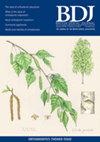2024年德国医院改革对牙源性脓肿患者住院治疗的医疗和经济影响:从COVID-19大流行中吸取的教训
IF 2.3
4区 医学
Q2 DENTISTRY, ORAL SURGERY & MEDICINE
引用次数: 0
摘要
2019冠状病毒病大流行严重扰乱了包括德国在内的全球医疗保健系统。本研究调查了大流行对牙脓肿管理的影响,并检查了即将到来的德国医疗改革的影响。目的评估2019冠状病毒病大流行对牙脓肿住院、重症监护病房(ICU)入院和治疗结果的影响,并分析这些发现与德国医疗改革之间的关系。设计回顾性队列研究。在慕尼黑设置一个主要的大都市医院。材料与方法对200例牙脓肿患者(2019年93例,2020年107例)进行研究。收集的数据包括人口统计、住院前抗生素使用、ICU入院情况和住院时间(LOS)。统计分析比较了两年内的结果。结果2020年ICU的LOS明显降低(3.3天,2019年为13.7天;p = 0.022)。到2020年,更多的患者在住院前接受抗生素治疗,所需的手术减少。总体而言,2020年医院资源利用效率更高。大流行强调了预防性牙科保健的重要性。它强调了当地牙科诊所如何在管理牙科紧急情况方面发挥更重要的作用,这对德国医疗保健系统未来的结构和资源分配有潜在的影响。结论新冠肺炎大流行重塑了牙科急诊服务和医院资源利用。这种转变对未来的医疗保健组织具有重要意义,特别是在德国医院改革的背景下。本文章由计算机程序翻译,如有差异,请以英文原文为准。
Medical and economic influence of the German hospital reform in 2024 on the hospitalisation and treatment of patients with odontogenic abscesses: the lessons learnt from the COVID-19 pandemic
Introduction The COVID-19 pandemic significantly disrupted healthcare systems worldwide, including in Germany. This study investigated the impact of the pandemic on the management of dental abscesses and examined the implications for the upcoming German healthcare reform. Aims To assess how the COVID-19 pandemic affected hospitalisation, intensive care unit (ICU) admissions and treatment outcomes for dental abscesses, and to analyse the relationships between these findings and the German healthcare reform. Design Retrospective cohort study. Setting A major metropolitan hospital in Munich. Materials and methods In total, 200 patients (93 in 2019, 107 in 2020) with dental abscesses were studied. Data collected included demographics, pre-hospitalisation antibiotic use, ICU admissions, and length of stay (LOS). Statistical analysis compared the outcomes between the two years. Results ICU LOS significantly decreased in 2020 (3.3 days versus 13.7 days in 2019; p = 0.022). More patients in 2020 received antibiotics before hospitalisation and fewer required surgeries. Overall, hospital resource usage was more efficient in 2020. Discussion The pandemic emphasised the importance of preventive dental care. It highlighted how local dental offices can play a more significant role in managing dental emergencies, with potential implications for the German healthcare system's future structure and resource allocation. Conclusion The COVID-19 pandemic reshaped dental emergency care and hospital resource usage. This shift has significant implications for the future organisation of healthcare, especially in the context of the German hospital reform.
求助全文
通过发布文献求助,成功后即可免费获取论文全文。
去求助
来源期刊

British Dental Journal
医学-牙科与口腔外科
CiteScore
3.10
自引率
15.40%
发文量
1096
审稿时长
4-8 weeks
期刊介绍:
The role of the BDJ is to inform its readers of ideas, opinions, developments and key issues in dentistry - clinical, practical and scientific - stimulating interest, debate and discussion amongst dentists of all disciplines. All papers published in the BDJ are subject to rigorous peer review.
 求助内容:
求助内容: 应助结果提醒方式:
应助结果提醒方式:


